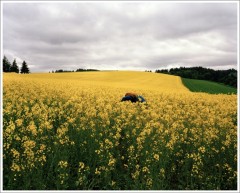Essays Jake Uitti — August 12, 2014 14:11 — 0 Comments
On Robin Williams
Caleb Thompson and I have talked for a couple of years now about the idea of having a confidant: a friend, someone you can tell your secrets to, your doubts, your worries, your mistakes, whatever those things are that you want to express but think you wouldn’t otherwise be able to. The kind of person who would be comfortable seeing you, intellectually-speaking at least, naked.Â
I think the idea first came up between us when Amy Winehouse died. Amy was someone we both admired and whose work we continue to admire. She is a member of the dreaded 27-Club, or those people in the public eye who’ve died tragically young, seemingly because they felt supremely alone.
When talking about Amy, our conversation couldn’t avoid talking about Kurt Cobain. How we assumed, as only assumptions can be made now, how Kurt never had anyone to talk to actually. Someone who he felt he could shed his ideas of sadness, offer vulnerable insights into his difficult fame, how he secluded himself.
It was around this idea of fear of not being able to simply talk that helped strengthen the friendship between Caleb and I as we continue to navigate our own lives, our work together on The Monarch, our work together at The Pub at Third Place and our work together in the band, The Great Um.
I was reminded of all of this instantly when I found out Robin Williams took his own life.
We hear now, after the suicide, all about Robin. How meaningful he was to us growing up, how impactful he was in his dramatic roles in Dead Poets Society and Good Will Hunting. How his Genie character in Alladin was timeless and impossible to top.
Of course, no one could truly understand how he was feeling directly leading up to his apparent suicide. We couldn’t assume someone with so much fame, so many riches, so much talent could be so sad. Or could we? Perhaps by now we should know that these are the affects of fame. That sadness is inevitable. And short of changing the entire structure of success, or fame, there is nothing else that we, as a people, can do about very personal feelings of isolation.
I am reminded of these two quotes from Robin, one in GWH and another from his movie World’s Greatest Dad:
“It’s not your fault.â€
“I used to think the worst thing in life was to end up all alone. It’s not. The worst thing in life is ending up with people who make you feel all alone.â€
What I want to do here, now, is continue the very important conversation – to stress the idea that it is supremely important to have someone to talk to. That we, as people, shouldn’t be quick to judge or dismiss ideas of insecurity, self-doubt, mistakes made (perhaps even terrible mistakes made) and the like. In fact, offering an openness to the expression of these ideas is integral to the fabric of what can make us, both individually and societally, Great. To take it a step further, embarrassment and isolation are the antithesis to being a Great people.
So, please, talk, share, expose yourself – and if there is no one else you think you can turn to, you can turn to me. I swear to it.
The answer isn't poetry, but rather language
- Richard Kenney



